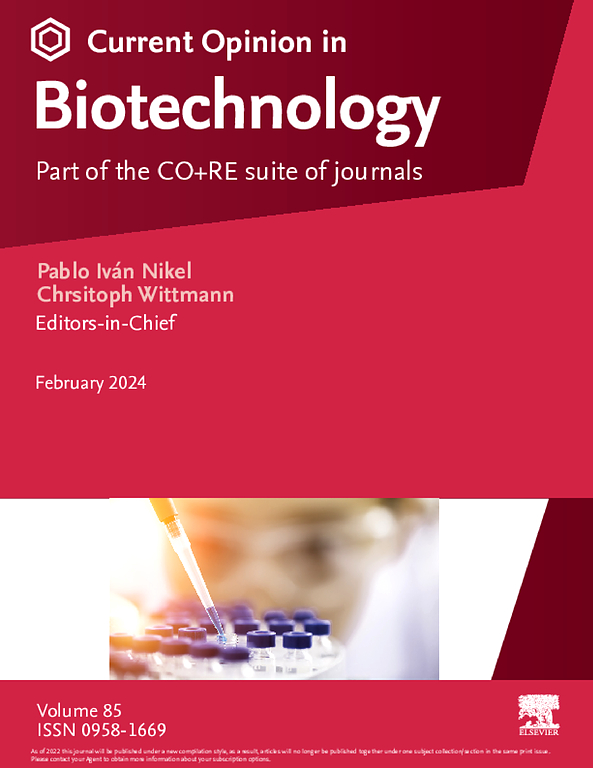Anaerobic microbial methanol utilization as a one-carbon feedstock
IF 7.1
2区 工程技术
Q1 BIOCHEMICAL RESEARCH METHODS
引用次数: 0
Abstract
Acetogens are anaerobic bacteria of special interest in fighting environmental and economic impacts caused by massive carbon emissions that pollute our Earth’s atmosphere. These microbes have the unique ability to convert carbon monoxide, carbon dioxide, or methanol into value-added bioproducts. The gas fermentation technology is already at industrial scale and is making use of special acetogens able to produce ethanol natively. Here, we propose a methanol-based bioconversion process using anaerobic methylotrophic acetogens (Eubacterium limosum or Eubacterium callanderi) to produce natively only butyrate or butanol, if genetically modified. Therefore, we depict the crucial fermentation parameters and explain the underlying metabolic pathways to steer these biocatalysts towards sole butyrate production. Additionally, the available genetic toolkits are outlined, and the insights gained via system biology approaches are presented. The concept of the suggested bioprocess is only sustainable if green methanol is used as one-carbon feedstock. The use of black or gray methanol would undoubtedly counteract all efforts towards net-zero CO2 emissions. To meet tightening climate targets and environmental, social, and governance commitments, stakeholders must evaluate a spectrum of low‑carbon technologies. The data presented here indicate that biotechnological fermentations can reduce emissions while remaining commercially competitive, and therefore warrant serious consideration for future industrial deployment and investment.
厌氧微生物甲醇作为单碳原料的利用
产氧菌是一种厌氧菌,在对抗由污染地球大气的大量碳排放造成的环境和经济影响方面具有特殊的意义。这些微生物具有将一氧化碳、二氧化碳或甲醇转化为增值生物产品的独特能力。气体发酵技术已达到工业规模,利用的是能够自然产生乙醇的特殊醋酸。在这里,我们提出了一种基于甲醇的生物转化工艺,使用厌氧甲基营养性醋酸菌(石灰质真杆菌或callanderi真杆菌),如果进行转基因,则仅生产天然丁酸盐或丁醇。因此,我们描述了关键的发酵参数,并解释了潜在的代谢途径,以引导这些生物催化剂生产单一丁酸盐。此外,概述了可用的遗传工具包,并介绍了通过系统生物学方法获得的见解。如果使用绿色甲醇作为单碳原料,建议的生物过程概念是可持续的。使用黑色或灰色甲醇无疑会抵消所有实现二氧化碳净零排放的努力。为了实现日益严格的气候目标以及环境、社会和治理承诺,利益相关者必须评估一系列低碳技术。这里提供的数据表明,生物技术发酵可以减少排放,同时保持商业竞争力,因此值得认真考虑未来的工业部署和投资。
本文章由计算机程序翻译,如有差异,请以英文原文为准。
求助全文
约1分钟内获得全文
求助全文
来源期刊

Current opinion in biotechnology
工程技术-生化研究方法
CiteScore
16.20
自引率
2.60%
发文量
226
审稿时长
4-8 weeks
期刊介绍:
Current Opinion in Biotechnology (COBIOT) is renowned for publishing authoritative, comprehensive, and systematic reviews. By offering clear and readable syntheses of current advances in biotechnology, COBIOT assists specialists in staying updated on the latest developments in the field. Expert authors annotate the most noteworthy papers from the vast array of information available today, providing readers with valuable insights and saving them time.
As part of the Current Opinion and Research (CO+RE) suite of journals, COBIOT is accompanied by the open-access primary research journal, Current Research in Biotechnology (CRBIOT). Leveraging the editorial excellence, high impact, and global reach of the Current Opinion legacy, CO+RE journals ensure they are widely read resources integral to scientists' workflows.
COBIOT is organized into themed sections, each reviewed once a year. These themes cover various areas of biotechnology, including analytical biotechnology, plant biotechnology, food biotechnology, energy biotechnology, environmental biotechnology, systems biology, nanobiotechnology, tissue, cell, and pathway engineering, chemical biotechnology, and pharmaceutical biotechnology.
 求助内容:
求助内容: 应助结果提醒方式:
应助结果提醒方式:


